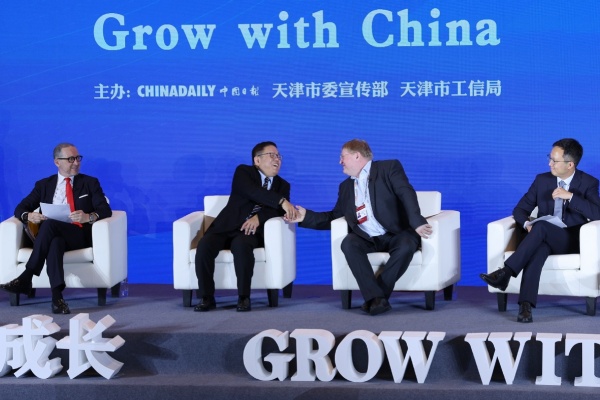
- Home
- Media Center
-
Events
- Wuzhen Summit
- Regional Forums
- Practice Cases of Jointly Building a Community with a Shared Future in Cyberspace
- World Internet Conference Awards for Pioneering Science and Technology
- The Light of Internet Expo
- Straight to Wuzhen Competition
- Global Youth Leadership Program
- WIC Distinguished Contribution Award
- Membership
- Research & Cooperation
- Digital Academy
-
Reports
- Collection of cases on Jointly Building a Community with a Shared Future in Cyberspace
- Collection of Shortlisted Achievements of World Internet Conference Awards for Pioneering Science and Technology
- Reports on Artificial Intelligence
- Reports on Cross — Border Ecommerce
- Reports on Data
- Outcomes of Think Tank Cooperation Program
- Series on Sovereignty in Cyberspace Theory and Practice
- Other Achievements
- About WIC
- 中文 | EN

Forum eyes prospects presented by AI era

The "CEO: Grow with China" roundtable is held in Tianjin on Friday. As a part of the World Intelligence Expo 2024, the event is jointly held by China Daily, the Publicity Department of Tianjin Municipal Committee of the Communist Party of China, and Tianjin Industrial and Information Technology Bureau. [Photo/China Daily]
China's status as a leading industrial powerhouse in the world will become even more pronounced in the era of AI, as artificial intelligence technology continues to advance in the nation and the digitalization of manufacturing progresses further, business leaders and experts said on Friday.
They also said that the development of intelligent technologies in China will reshape many industries and create more growth opportunities for enterprises at home and abroad.
They made the remarks during the "CEO: Grow with China" roundtable, which was jointly held by China Daily, the Publicity Department of Tianjin Municipal Committee of the Communist Party of China, and Tianjin Industrial and Information Technology Bureau.
It was a sideline event of the ongoing World Intelligence Expo 2024, which opened in the city on Thursday.
"AI technologies and (other) innovative technologies in China will be moving in the right direction, thanks to favorable policies and early implementation and many of these technologies — such as face recognition and other things — that were done for the past two to three years in China," said Rani Jarkas, chairman of Cedrus Group.
China will become a top leader in the field by 2030 to 2035, he said.
"It's very clear that alongside the investment in capacity, we've seen the introduction of greater automation, as well as the application of digital manufacturing techniques. And we see that in our supply chain in China today," said Julian MacCormac, regional director of Greater China at Rolls-Royce.
"We have to invest in this region, so that we're able to get close to our customers. And also then that we can provide the services and the support that our customers need to service that growing installed fleet in China," said MacCormac, who is also chair emeritus of the British Chamber of Commerce in China.
Wei Jianguo, China's former vice-minister of commerce, said the global manufacturing sector is currently being restructured. The sector is moving toward becoming more digital, intelligent and low-carbon, as well as providing higher-quality services.
"It is foreseeable that digitalization will continue to empower China's industrial upgrades and smart manufacturing. The country is expected to make new contributions to global industrial progress and economic development," said Zhao Zhongxiu, president of the Beijing-based University of International Business and Economics.
At the event, experts and business executives also voiced strong confidence in the bright prospects of the Chinese economy, while congratulating the successful convening of the World Intelligence Expo 2024 in Tianjin.
Peter Merker, director of the German Chamber of Commerce in China for Tianjin and CEO of Schlote Tianjin, said China provides favorable conditions for the development of new technologies, including ample funding, a robust market, and support from government policies. He firmly opposes sanctions on new technologies, and advocates for enhanced international cooperation for mutual benefit. "Sanctions? No! Let's extend our hands and work together!" he said.
Peter Jeng, vice-president of the UK Chinese Business Association, said the wider application of AI technologies will help Chinese goods going abroad.
Business leaders and experts at the roundtable also discussed new models and driving forces for the development of Tianjin's intelligent industries and smart manufacturing. They said the city's high-quality development will create more opportunities for both Chinese and foreign companies.
As a major port city in China, Tianjin has striven to become a pioneer in the AI sector, with efforts in introducing preferential policies and developing cutting-edge technologies to advance industrial upgrades and expand the application scenarios of new technologies.
AI-related industries in Tianjin generated more than 300 billion yuan ($41.32 billion) in operating revenue last year. AI is accelerating the new industrialization of the city and has become a new driving force for the development of new quality productive forces.

The World Internet Conference (WIC) was established as an international organization on July 12, 2022, headquartered in Beijing, China. It was jointly initiated by Global System for Mobile Communication Association (GSMA), National Computer Network Emergency Response Technical Team/Coordination Center of China (CNCERT), China Internet Network Information Center (CNNIC), Alibaba Group, Tencent, and Zhijiang Lab.





